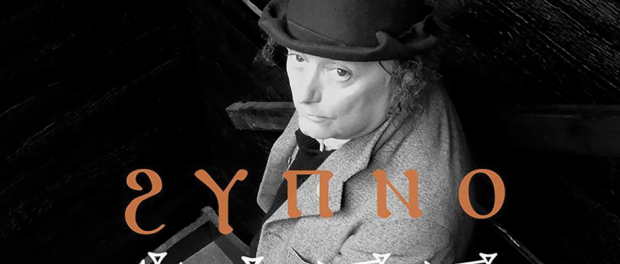Hypnopazūzu – Create Christ, Sailor Boy

The first minute of Hypnopazūzu – the duo of producer Youth and Current 93’s David Tibet – suggests merely Tibet’s diverse, yet mid-paced psychedelia hardwired with electronics. It’s a deeply deceptive impression; Create Christ, Sailor Boy is a highlight in both artists’ long discographies.
Opener ‘Your Eyes In The Skittle Hills’ sets the template for what is to come. As that first minute ends Tibet launches in at full stretch pouring meaning into the line chosen for album title. By three minutes in Youth has summoned a lavishly orchestral backdrop that keeps Tibet at high intensity; his voice strains for the peaks his sonic surroundings demand. That sense of urgency, of determination to wring glory from each moment, it never relents from here on in. Far from sounding cowed or intimidated amid the high-gloss digital sound that Youth brings, Tibet sounds reinvigorated both lyrically and vocally – at times the smiling spite and violence of his earliest works seems rekindled and brought to full blaze. The record is imbued with echoes from some of the best work of the Eighties – all brought up to 2016-standard: the bass parts on ‘Sweet Sodom Singsongs’ conjure with Jah Wobble’s most pop chart worthy efforts while, at moments, Tibet’s twang originates inside the mouth of PiL-era John Lydon. The luxurious backdrop pushes Tibet to some of his most assured performances ever (no small claim) – on ‘Christmas With The Channellers’ his voice soars again and again to sustained peaks, wrenching power and drama from every word. Each time Tibet reaches a new height the music surrounding him surges forward, pressing, lifting and carrying the vocalist still higher. It’s a testament to Youth’s abilities as a musician and producer that the music works throughout in such synergistic unison with the voice.
Musically, the only uniform feature of this record is its scale. There’s a relentless hunger here, the sound of an ecstatic and accomplished pairing delighted by what they’re achieving. The music leaves the impression that its creators ended each effort drenched in sweat, drained, exhausted… and thoroughly, deservedly, exalting in the experience. On ‘The Crow At Play’ hand drums and exotica bake the track – a musical theme expanded upon on the later ‘Sweet Sodom Singsongs’ which even has space for what sounds like the Muslim summons to prayer that rings out daily from North Africa to the mountains of Afghanistan. By contrast the shaking strings and synthesisers on ‘Night Shout, Bird Tongue’ suggest a crooner anthem at a Mafioso wedding before parched guitars enter and a bell tolls sparsely. ‘Magog At The Maypole’, ‘Christmas With The Channellers’, ‘The Sex Of Stars’ – they’re all genuine anthems, songs that foreground how Tibet’s voice – oft-dismissed as ‘an acquired taste’ – fares well against such a vast canvas of fanfares worthy of Hollywood closing credits.
There are numerous highlights. ‘Pinnochio’s Handjob’ sounds like the victory theme of some Biblical epic – the music swells ever further lending a majesty to Tibet’s blend of the puckish and the profound which allows one to smile in amazement at lines like “the usual grab-bag of sublime visions such as Pinnochio under Golgotha, Pinnochio’s handjob, Pinnochio triumphant!” Tibet’s spinning of the childlike, the shocking, the wildly imagined into a single thread elevates him from ranting hobo to one of the few singers alive whose words, written down, bear close examination and a comparison to poetry. Again, that sense of elements being plucked from the past; Tibet conjures knowingly with familiar lyrical concerns – at mention of Pinnochio I immediately thought of his one-time fascination with transplanting another wooden puppet into biblical grandeur – ‘the Noddy apocalypse’ played out on 1988’s Swastikas For Noddy album. The title of track ‘The Sex Of Stars’ comes from the recent Current 93 album I Am The Last Of All The Field That Fell. Twice on this album Tibet incants “Neither coming nor going but what is shall be,” paraphrasing a line – “neither coming here nor going” – from 1992’s ‘A Sadness Song’ (on Thunder Perfect Mind) and marrying it to an equally hopeful fatalism; the original line to follow having continued with a shrug of “neither heaven here nor hell.”
Sitting down with a copy of his collected lyrics – the now-rare volume Sing Omega – it’s possible to appreciate how rich Tibet’s imagery, his vision, his talent has always been – the lyrics on this album would stand as a worthy new chapter to that tome. On ‘The Auras Are Escaping Into The Forest’ he abandons the English language altogether. I suspect it’s Coptic Greek (in which Tibet is fluent) but I may be wrong, it doesn’t matter; it’s about watching an artist in such control that all he needs is tone, inflection, gain or loss to convey emotion, to convey the ineffably substantial and affecting. In Youth he has found an equally talented foil and, together, they have made one of the year’s best albums.
